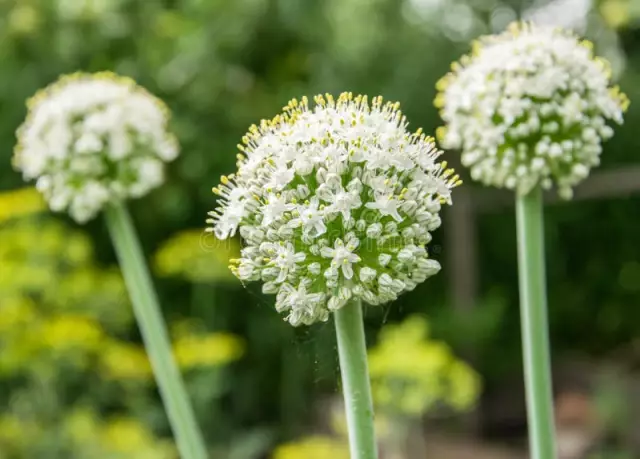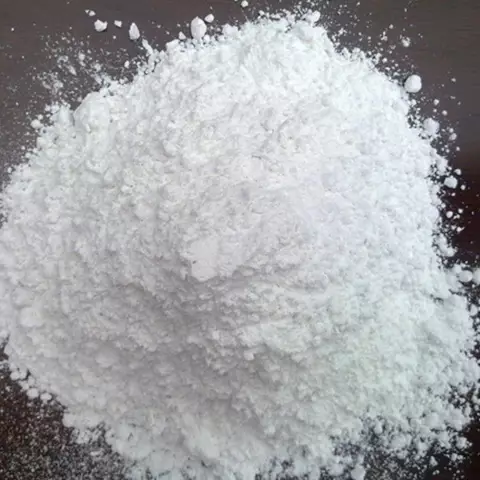- Author Rachel Wainwright wainwright@abchealthonline.com.
- Public 2023-12-15 07:39.
- Last modified 2025-11-02 20:14.
Batun onion
Batun onion, or, as it is also called, fisty onion or Tatar, is a perennial plant of the Onion family.

Asia is considered the birthplace of onion batuna, however, today the plant is widespread throughout, practically throughout Russia, with the exception of the regions of the Far North.
There are several types of onion batuna: Russian, Chinese and Japanese. The most frost-resistant of them is the Russian species, capable of withstanding temperatures down to -10 degrees Celsius. The other two species tolerate adverse environmental conditions much worse.
The onion does not form a full-fledged onion, therefore, only its peculiar stems that look like a pipe are used for food. 2-3 years after planting, the batun onion begins to branch, forming up to 40 branches. Around the same time, a shoot appears with a round cap of small white flowers, abundantly secreting nectar.
Useful properties of batun onions
Along with the external resemblance, the batun onion has all the useful qualities of onions. Since ancient times, this hot seasoning has been used as an additive to food with a specific taste, as well as as a remedy that successfully fights against many common diseases.
In the green leaves of onion, an excess amount of ascorbic and nicotinic acids, carotene, riboflavin, thiamine, magnesium, potassium, iron salts, essential oil, which gives the plant a special taste and aroma, with bitterness, is contained. It should be noted that the content of vitamin C in the onion is higher than that found in the feathers of onions.
The beneficial properties of onion are especially valuable in the spring - the time when most people suffer from vitamin deficiency and need increased support.
According to scientists, 150 grams of onion batuna (one large onion) replenish half the daily intake of vitamins A and C, as well as one fifth of the body's need for calcium and potassium - elements that improve the cardiovascular system of the body. It is known that preparations are made from batun onions that help to lower blood pressure and increase the elasticity of capillary vessels.
The carotene contained in the green onion is responsible for the healthy condition of the skin and mucous membranes of the body. In Chinese medicine, the plant has been used as a tonic, diaphoretic, and pain reliever for stomach ailments.
The batun onion is famous for its strong disinfecting effect.
Nutritional value of onion
The calorie content of onion is only 34 kcal / 100 grams of product. Nutritional value of the plant:
- Protein - 1.3 g;
- Fat - 0.1 g;
- Carbohydrates - 3.2 g.

Batun onion contains substances useful for our body such as choline (6.1 mg), vitamin PP (0.35 mg), vitamin B1 (0.05 mg), vitamin B2 (0.03 mg), vitamin B5 (0, 12 mg), vitamin B6 (0.12 mg), vitamin B9 (19 μg), vitamin K (0.4 μg), vitamin E (0.02 μg), zinc (0.17 g), selenium (0, 5 μg), fluorine (1.1 μg), manganese (0.13 mg), phosphorus (29 mg), iron (0.21 mg), magnesium (10 mg), sodium (4 mg), potassium (146 mg) and calcium (23 mg).
Nutritionists recommend including the onion in the diet for people suffering from metabolic disorders, liver diseases, kidney stones, gout, rheumatism, atherosclerosis, dysentery, hypertension.
Application
In cooking, only the stems (greens) of batun onions are used - as a seasoning for meat, fish dishes, salads, sauces. In Tatar cuisine, it is customary to use batun onions as an independent appetizer baked with eggs and cheese.
The onion is also used in folk medicine, where the plant is widely used as a diuretic, antihelminthic and hemostatic agent.
For the treatment of diseases of the gastrointestinal tract, fever, the cardiovascular system, a tincture of onion is used. For its preparation, it is necessary to place chopped batun onions in a container, pour the plant with 70% alcohol (1: 4), leave for a week, then strain and take 15-20 drops, diluted in 50 ml of cold drinking water.
As a remedy for rapid fatigue, a decoction of batun onions is taken. It is prepared as follows: 80 g of greens are crushed, 200 ml of boiling water are poured, infused for 30 minutes, and then filtered. A tincture of 200 ml is taken twice a day after meals.
Contraindications
Despite the many beneficial properties of the onion, excessive consumption of the plant in food can lead to increased excitability of the nervous system. It is not recommended to abuse dishes flavored with onions with batun, people suffering from gastric ulcer and duodenal ulcer, pancreatitis and gastritis.
YouTube video related to the article:
Found a mistake in the text? Select it and press Ctrl + Enter.






